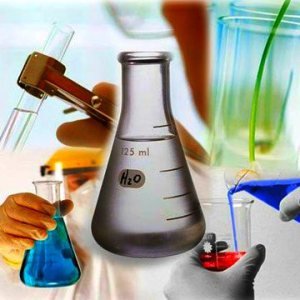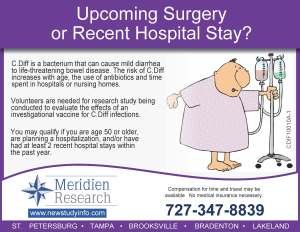*In The News*
Synthetic Biologics, Inc. a developer of novel anti-infective biologic and drug candidates targeting specific pathogens that cause serious infections and diseases, announced today the formation of a Clinical Advisory Board (CAB) to support development of SYN-004, the Company’s lead anti-infective product candidate for the prevention of the devastating effects of Clostridium difficile (C. difficile). The new CAB is comprised of industry leaders Mark Wilcox, M.D., (Chairman), Curtis Donskey, M.D., Ciarán Kelly, M.D. and Tom Louie, M.D., all of whom will provide expertise and guidance on each aspect of the C. diff clinical program.
SYN-004 has the potential to protect the gut microbiome from the effects of IV beta-lactam antibiotics for the prevention of C. difficile infection. Synthetic Biologics expects to initiate Phase Ia and Ib clinical trials to evaluate SYN-004 in the second half of 2014, with preliminary topline data expected by year-end 2014. A Phase II efficacy study of SYN-004 is expected to begin in the first half of 2015.
“As we move closer to initiating human clinical trials of SYN-004, and build our global leadership position in the C. difficile prevention space, we are pleased to assemble this group of highly experienced and knowledgeable advisors to guide clinical development of our program,” stated Jeffrey Riley,CEO of Synthetic Biologics. “Synthetic Biologics’ new CAB combines some of the strongest collective expertise in the C. difficile area, and we should benefit greatly from its insight and guidance as we move toward the clinic.”
“I’m pleased to chair Synthetic Biologics’ C. difficile CAB,” said Dr. Wilcox. “SYN-004 has the potential to have a significant impact on mitigating this urgent public health threat, and I look forward to working with the other advisory board members to help the Company move this promising program forward as expeditiously and strategically as possible.”
Professor Mark Wilcox M.D., FRCPath, is a Consultant Microbiologist, Head of Microbiology and Academic Lead of Pathology at the Leeds Teaching Hospitals (LTHT), Professor of Medical Microbiology at the University of Leeds at their Institute of Biomedical and Clinical Sciences, and is the lead on Clostridium difficile for Public Health England in the UK. He was formerly the Director of Infection Prevention, Infection Control Doctor and Clinical Director of Pathology at LTHT. Dr. Wilcox is deputy Chair of the UK Department of Health’s Antimicrobial Resistance and Healthcare Associated Infection Committee and is a member of the HPA’s Program Board on Healthcare Associated Infection & Antimicrobial Resistance. He has a track record of translational research, including providing the basis of clinical advice to the NHS. He has been the Principal/UK Investigator for several clinical trials of new anti-infective drugs and has provided clinical advice as part of the FDA/EMA submissions for the approval of several novel antimicrobial agents.
Curtis Donskey, M.D., is Associate Professor of Medicine at Case Western Reserve University School of Medicine, as well as Chairman of the Infection Control Committee at the Louis Stokes Cleveland Veterans’ Affairs Medical Center. His expertise and research focus includes the epidemiology and transmission of C. difficile infections in the elderly and in nursing home populations, as well as the infection control issues of antibiotic use. Dr. Donskey has moderated a number of national conferences on the epidemiology of C. difficile.
Ciarán P. Kelly, M.D., is Professor of medicine at Harvard Medical School, as well as Director of Gastroenterology Fellowship Training and Medical Director of the Celiac Center at Beth Israel Deaconess Medical Center in Boston, MA. Dr. Kelly has longstanding clinical and research interests into the causes, diagnosis and treatment of Clostridium difficile infection, and he leads NIH-funded research on C. difficile colitis. Dr. Kelly has authored numerous clinical and basic research book chapters, invited reviews, and more than 100 peer-reviewed publications appearing in such journals as Infection & Immunity, American Journal of Physiology, Gastroenterology, Journal of Biological Chemistry, Journal of Clinical Investigation, The Lancet and New England Journal of Medicine.
Thomas Louie, M.D., is Professor of Medicine in the department of medicine and microbiology-immunology & infectious diseases at the University of Calgary in Alberta, Canada. He also serves as Infection Prevention & Control officer at Alberta Health Services, and was the Medical Director of the infection prevention and control program in the Calgary Health Region 1998-2013. He is involved in clinical trials of new antimicrobial agents primarily for the treatment of C. difficile infection. His research interests include the ecology of hospital-acquired infections in patients receiving antibiotics, and studies on the role of the gut microflora and its replacement by fecal transplantation for the treatment of recurrent C. difficile infection, and possible roles for the prevention of other nosocomial infections.
About Synthetic Biologics, Inc.
Synthetic Biologics, Inc. is a biotechnology company focused on the development of novel anti-infective biologic and drug candidates targeting specific pathogens that cause serious infections and diseases. The Company is developing an oral biologic to protect the gastrointestinal microflora from the effects of IV antibiotics for the prevention of Clostridium difficile infection, an oral treatment to reduce the impact of methane producing organisms on constipation-predominant irritable bowel syndrome (C-IBS), a series of monoclonal antibodies for the treatment of Pertussis and Acinetobacter infections, and a biologic targeted at the prevention and treatment of a root cause of a subset of IBS. In addition, the Company is developing an oral estriol drug for the treatment of relapsing-remitting multiple sclerosis (MS) and cognitive dysfunction in MS. For more information, please visit Synthetic Biologics’ website at www.syntheticbiologics.com.
This release includes forward-looking statements on Synthetic Biologics’ current expectations and projections about future events. In some cases forward-looking statements can be identified by terminology such as “may,” “should,” “potential,” “continue,” “expects,” “anticipates,” “intends,” “plans,” “believes,” “estimates,” and similar expressions. These statements are based upon current beliefs, expectations and assumptions and are subject to a number of risks and uncertainties, many of which are difficult to predict and include statements regarding the expected contribution of the CAB members, the potential for SYN -004 and the timing of the clinical trials. The forward-looking statements are subject to risks and uncertainties that could cause actual results to differ materially from those set forth or implied by any forward-looking statements. Important factors that could cause actual results to differ materially from those reflected in Synthetic Biologics’ forward-looking statements include, among others, our failure to initiate trials within the anticipated time frame, the ability to successfully integrate the clinical advisory board members and other factors described in Synthetic Biologics’ report on Form 10-K for the year ended December 31, 2013 and any other filings with the SEC. The information in this release is provided only as of the date of this release, and Synthetic Biologics undertakes no obligation to update any forward-looking statements contained in this release on account of new information, future events, or otherwise, except as required by law.
SOURCE Synthetic Biologics, Inc.




